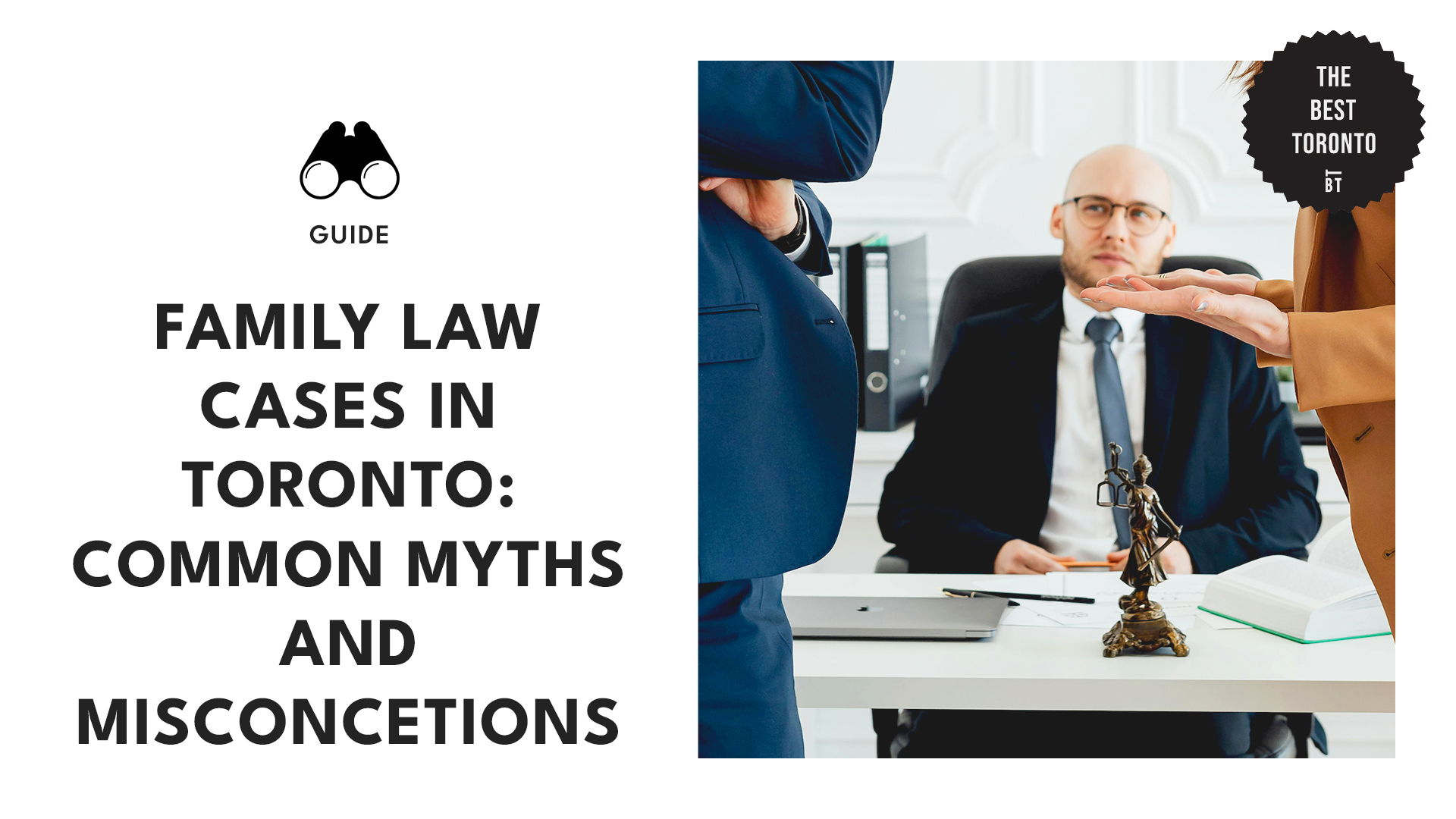Braving the stormy seas of divorce and family law in Ontario can feel like navigating the whole treacherous world. Even if both parties are on the same page, the rollercoaster of emotions can throw a wrench in the works.
And let’s not forget about the boatload of myths floating around, ready to capsize even the most seaworthy of seemingly sane sailors and lifeboat partners.
While divorce and separation can indeed be choppy waters due to all sorts of emotional and legal complexities, we shouldn’t let misconceptions about Ontario’s laws steer us off course.
These tall tales can lead to false assumptions, unjust outcomes, and enough stress to make even the hardiest of sailors want to jump ship.
We’re here to hoist the anchor and set the record straight, debunking (and drowning) these myths and providing a sturdy compass to help you navigate the legal seas with confidence.
We’ll empower you to chart a course towards informed decisions, safeguarding your rights and interests as you navigate the often turbulent waters of family law.
Let’s get right to the made-up myths and anchor on the actual truths!
- Myth #1: Mothers are prioritized in child parenting time and decision-making.
- Myth #2: Whoever the children live with has sole custody.
- Myth #3: Assets and property are always divided equally.
- Myth #4: Couples in common-law relationships enjoy equal rights to married couples.
- Myth #5: If my spouse cheated, the courts will support me.
- Myth #6: Spousal support is always granted in divorces.
- Myth #7: Child support stops at age 18.
- Myth #8: You can handle a divorce in Ontario without a lawyer.
Myth #1: Mothers are prioritized in child parenting time and decision-making.

The assumption that mothers always receive priority in child parenting time and decision-making during family law cases is simply not true.
Research shows that shared parenting arrangements, where both parents are actively involved, can greatly benefit children post-separation or divorce.
When it comes to custody, the courts are all about what’s best for the children. They weigh things like how cozy the children are with each parent, their overall happiness, and whether both parents are up to snuff in the caretaking department.
And gender’s not even on the courts’ radars! Whether you’re a knight or a dame, it’s all about your parenting prowess, not what’s under your armor.
Myth #2: Whoever the children live with has sole custody.

It’s a common belief that if the children live primarily with one parent, that parent automatically has sole custody. However, custody and residence are not the same.
Custody involves decision-making authority, while residence determines where the children live.
Even if the children bunk with one parent most of the time, both folks can still share on the custody front. Yes, joint custody means you’re in it together, making those life-altering choices as a dynamic duo — even if you’re separated or divorced.
So, just because the kids live with you most of the time doesn’t necessarily mean you have sole custody.
Myth #3: Assets and property are always divided equally.

Okay, let’s debunk the myth that divorce means splitting assets right down the middle. Sure, it sounds tidy, but the truth is, it’s a bit more like a tangled web of complexity, especially in Ontario.
You can forget the cookie-cutter 50/50 split — there’s a whole lot more to consider. We’re talking about a meticulous process that takes into account everything from who brought what to the table to any agreements made beforehand.
So, when assuming it’s all about an equal split — think again. This journey through property division in family law is about navigating a maze of factors like asset types, each spouse’s contributions, and any pre-existing arrangements.
The bottom line is that assuming a clean cut down the middle can lead to some messy misunderstandings and potential showdowns in court. Plus, there’s the prenuptial or postnuptial agreement to consider — that is, if the couple took the time!
To steer clear of that drama, it’s best to seek the best counsel on family law. They’ll help you unravel the complexities, understand your rights, and come out the other side of divorce with your assets intact.
Myth #4: Couples in common-law relationships enjoy equal rights to married couples.

Let’s get things straight: common-law relationships don’t grant the same rights as marriage in Canada. While many assume that living together for a certain period automatically ensures equal legal standing, the reality is quite different.
The unfortunate truth for unmarried lovebirds is they don’t get the asset-splitting perks that come with tying the knot. This harsh reality often hits hard when the relationship hits the rocks, and suddenly, everyone’s scrambling to sort out who gets what.
Sure, there are ways for unmarried partners to fight for their fair share of the pie, but let’s be real, it’s a whole ordeal. Lawyers, paperwork, headaches — you name it.
So, to all common-law lovebirds out there, take heed: know your rights and maybe consider putting pen to paper on some agreements. It’ll save you a world of hurt and legal headaches later on.
Myth #5: If my spouse cheated, the courts will support me.

Infidelity does not guarantee favoritism in court. While catching your partner red-handed might feel like a gut punch, don’t expect the legal system to play favorites.
Canadian courts aren’t swayed by soap opera theatrics because they’re all about fairness. When it comes to dividing assets and making custody calls, it’s more about who brought what to the table and who needs what to keep the ship afloat.
Sure, cheating might add some drama to the mix, but in the grand legal scheme of things, it’s like bringing a teaspoon to a cutlery fight. So, if you’re counting on your partner’s wandering eye to score you some brownie points in court, think again.
Myth #6: Spousal support is always granted in divorces.

Spousal support is not always awarded in divorce cases. Sure, spousal support might get thrown into the mix, but it’s no guarantee.
Courts play detective, weighing factors like how long you’ve been married together, who’s raking in the dough, and whether the soon-to-be-ex can stand on their own two financial feet.
Bottom line? Don’t bank on getting that alimony jackpot.
It’s a case-by-case affair. Your divorce experience might include a spousal support pit stop, but it’s not the destination for everyone.
Myth #7: Child support stops at age 18.

Child support does not automatically end when a child turns 18. While many assume that reaching this milestone marks the end of financial obligations, the reality is more nuanced.
Sometimes, the support train keeps chugging along, especially if the offspring is off chasing higher education dreams, dealing with a disability, or still relying on mom and dad for their financial needs.
Parents should take note that their duty to keep the cash flow going might stretch beyond that big 18, ensuring their offspring aren’t left high and dry as they navigate the rocky waters of adulthood.
Myth #8: You can handle a divorce in Ontario without a lawyer.

Going through a divorce in Ontario without a lawyer might seem okay to some, but it’s not a good idea.
Divorce and other family law procedures can be really complicated, emotionally tough, and difficult to understand from all legal perspectives — unless you’re a family lawyer.
A good family law lawyer knows what to do and can give important help and support to make sure your rights are looked after during the whole thing. They can explain the legalities and help with making agreements.
Having a lawyer can also make things less stressful and less uncertain, so you can concentrate on getting through it all. It might feel like you can handle it alone, but getting a good lawyer is important for managing a divorce in Ontario the right way.
The quest for the perfect family lawyer can be a maze out there, leaving some folks frozen in fear. You don’t have to be one of them.
Sure, it might sting the wallet a bit, but finding the right legal eagle is an investment in peace of mind that’s totally worth it.





